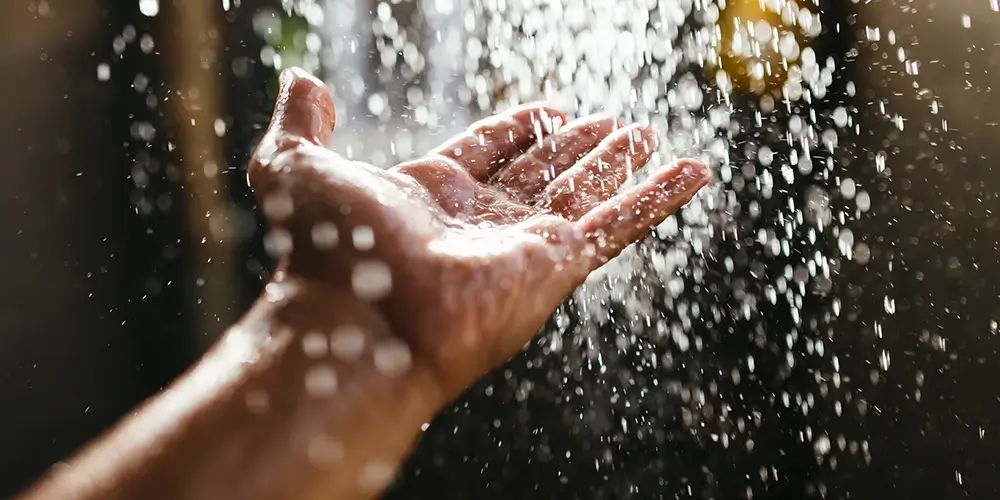Tankless water heater, continuous water heater, or instant water heater. These terms all describe the same thing: a powerful, compact water heater delivering near-instant hot water for as long as needed. Near-instant, virtually continuous, and without a water storage tank.
Tankless heaters are the latest and greatest water heaters on the market, and they offer an easy way to save energy, water, and money while boosting convenience and comfort. While they’re relatively new to the USA, the technology is nearly a century old. In Germany and Japan, where space is at a premium, tankless water heaters have been around since the 1990s. The global market may reach $8 billion by 2027.
So how are they different?
They’re small enough to be installed almost anywhere, even outdoors. Hot water travels through less pipe and is therefore “instant” at the point of use.
And unlike conventional water heaters with massive 20-80 gallon tanks (or larger), tankless water heaters heat water on demand. They heat only the water you need — no more or less.
How Does a Tankless Water Heater Work?
Standard Water Heater
A standard water heater holds 20 to 80 gallons of hot water at a set temperature. It’s heating that water all day, even when you’re at the office or away for the weekend. The water heater accounts for about 20% of total energy use in an average Orange County home. That’s a waste.
Most Orange County water heaters are installed in the garage or a utility closet, far from the main bathroom, and may travel through 30-100 ft of pipe to their points of use. That’s also a waste, not only in terms of energy but water.
Let’s say three gallons of water go down the drain before the water’s warm enough to shower. In a family of four, that adds up to 4,380 gallons of water annually, equivalent to a month of water use for the average Orange County home.
And that’s just bathing. Add to that the water you waste when you shave, wash dishes by hand, and so on while waiting for the warm water to arrive.
And when hot water leaves the tank, cold water replaces it. You may be wasting water waiting for the water heater to produce more hot water.
Tankless Water Heater
A tankless water heater, on the other hand:
- Uses powerful electric heating elements or a gas burner to heat water on demand
- Doesn’t store hot water in a tank, saving energy and money
- Has highly efficient flow sensors to start and stop the heating process as needed
- Can be installed close to the kitchen or bathroom since it has no indoor vent
- Provides virtually limitless hot water for as long as you need it
Hot water from a tankless water heater travels through much less pipe. Water doesn’t have to be kept warm in a tank.
Best of all, most new tankless heaters are Wi-Fi enabled. If the water feels too hot or cold, that’s an easy adjustment from the app.
Benefits of a Tankless Water Heater
Tankless water heaters offer several advantages.
- They’re more water-efficient. You aren’t wasting water waiting for your shower or bathwater to heat up.
- They’re more energy efficient. According to energy.gov, homes that use 41 gallons of hot water or less a day experience 24-34% greater energy efficiency with a tankless water heater. And homes that use 86 gallons of hot water daily see 8-14% greater efficiency; installing a second tankless water heater can improve this number.
- They last 50-100% longer than conventional water heaters.
- They’re compact and stylish. They take up much less space and can be installed under a kitchen sink, in a bathroom, or outdoors near the main bathroom.
- Most tankless heaters are Wi-Fi compatible. Adjusting the water temperature is easy as pie, and you can monitor hot water throughout the day. Need to chase that teen out of the shower? Turn down the water temp 30 degrees and see what happens.
Disadvantages of a Tankless Water Heater
- Tankless water heaters have a higher upfront cost than standard water heaters.
- Installation is complex. Technicians must install gas lines or additional electric wiring; the wrong kind can trigger a fire alarm.
- Tankless water heaters aren’t ideal for large households. If you live in a home with high hot water demands, you might have to install a second tankless heater.
- They require a powerful flow of electricity to heat water quickly, which isn’t always available in older homes.
- And suppose you buy a gas-powered continuous water heater (bear in mind that Orange County is gradually moving away from natural gas). In that case, the pilot light might offset some of your energy savings.
Upgrading to a Tankless Water Heater
Bathroom and kitchen remodeling jobs offer the best opportunity to upgrade your plumbing, including your water heating system. It’s a good time to install a tankless water heater to complement your new low-flow fixtures.
Homeowners can receive a rebate of up to $200 on Energy Star-certified tankless water heater systems. And beginning in 2023, the Federal Energy Efficient Home Improvement Tax Credit (under the Inflation Reduction Act of 2022) will provide up to $2,000 in tax credits for qualifying high-efficiency water heaters.
Talk to us at Orange Coast Plumbing. We’ll walk you through your options and help you find the best water heater for your home. And depending on the rebates and tax credits you receive, installing a new tankless water heater may cost next to nothing.
FAQ: Continuous Vs. Tankless Water Heaters
Q: What’s the main difference between continuous and tankless water heaters?
A: Continuous water heaters, often called storage tank water heaters, keep a tank of hot water at a ready temperature, ensuring hot water is available when needed. On the other hand, tankless water heaters heat water directly without a storage tank, providing hot water on demand.
A: How do continuous and tankless water heaters compare in terms of energy efficiency?
A: Tankless water heaters tend to be more energy-efficient than continuous water heaters. This is because tankless models only heat water when needed, eliminating the energy loss associated with constantly heating a tank of water.
A: Can both continuous and tankless water heaters use either gas or electricity?
A: Yes. The choice between gas and electric models will depend on your home’s existing utilities and your personal preference.
Q: What is the lifespan of continuous versus tankless water heaters?
A: Tankless water heaters generally have a longer lifespan. A tankless water heater lasts up to 20 years or more, while continuous water heaters typically last between 10 and 15 years.
Q: How do the initial installation costs of continuous and tankless water heaters compare?
A: The installation cost of a tankless water heater is typically higher than that of a continuous water heater. However, the long-term energy savings of a tankless model can offset the higher upfront cost.
Q: Are tankless water heaters suitable for homes with high hot water demand?
A: Yes, but it might require a larger capacity tankless water heater or multiple units to ensure an adequate supply of hot water across the home simultaneously
Q: How much space do continuous and tankless water heaters need?
A: Tankless water heaters are much smaller and can be installed on a wall, saving valuable floor space in your home. In contrast, continuous water heaters require more space due to their large storage tanks.
Q: Do continuous and tankless water heaters require the same maintenance?
A: Tankless water heaters usually need less maintenance than their continuous counterparts, though a professional should inspect both annually.
Q: Can either type of water heater supply enough hot water for a large household?
A: An appropriately sized continuous water heater can supply a constant hot water reservoir, but the tank size limits capacity. If sized correctly for your home’s demand, a tankless water heater can provide a continuous hot water supply without running out.
Q: Is one type of water heater clearly better than the other?
A: The best choice depends on your household’s hot water needs, your budget, the space available for installation, and your energy efficiency preferences. While tankless water heaters offer savings on energy bills and space, continuous water heaters have a lower initial cost and are less complex to install.
Resources
- Wikipedia: Tankless Water Heating
- Energy.gov: Tankless or Demand-Type Water Heaters
- Energystar.gov: Whole Home Tankless Water Heaters
- Energy.gov: Heat Pump Water Heaters
- Energy.gov: Selecting a New Water Heater

